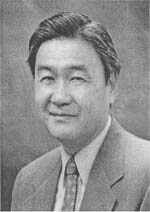
Alan Nishio
Long time Asian American activist, Alan Nishio has been selected as this year's recipient of the NCRR's "Fighting Spirit Award." Given in conjunction with each DOR program, this award honors individuals who have exhibited a strong commitment to the struggle for justice and have shown the fighting spirit necessary to help win redress for the Japanese American community. Nishio, who currently serves as the Associate Vice President of Student Services at California State University, Long Beach, was one of the early participants in the Asian American Movement, a call for social change that swept through college campuses and Asian communities during the 1970's. Heavily influenced by the civil rights movement and the opposition to the war in Vietnam, the movement involved many Japanese Americans in a nation-wide push for social change.
After graduating from UC Berkeley, Nishio, a native of Culver City/Venice, returned to southern California to participate in a Master's degree program in Public Administration at USC. At USC he started his career as Assistant Director at the Center for Social Action. After graduation, he accepted the position of Director for the Asian American Studies Program at UCLA. Many have credited him with developing this program into one of the largest centers of Asian American scholarship and activity in the nation.
Beyond his work at college campuses, Nishio was one of the earliest of the Sansei generation who sought to resurrect and save the historic Little Tokyo community. He was a founding member and President the Little Tokyo Peoples Rights Organization (LTPRO). In the 70's, this grassroots group challenged the evictions caused by the redevelopment in Little Tokyo that threatened to displace many cultural groups, social service organizations and elderly Issei tenants who lived in the small hotels in the area.
Moving LTPRO forward, Nishio helped to bring the organization into the campaign for redress in 1980. He was a founding member of the National Coalition for Redress/Reparations, now known as the Nikkei for Civil Rights and Redress. He has served as a Co-Chairperson of NCRR and is widely credited as one of the architects of NCRR's historic lobbying effort to Washington D.C. in 1987.
His ties to the local community have always been strong, evidenced by his service on the boards of Visual Communications and the Japanese American Community Services organizations. He remains very committed and active in Asian American affairs. Having served as past president of the Little Tokyo Service Center, he is currently on its board as well as on the board of LTSC's Community Development Corporation